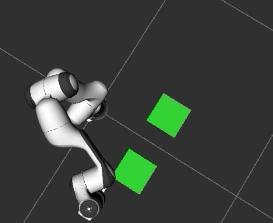Tutorial: Instant-Use Move Behaviours with PyTrees and Logical Scene
This tutorials illustrates how to use scene configuration to enrich the target pose parameter with logical scene names.
This demo requires the Panda robot model.
Running the Demo Program
Assume that the task trees and the arm commander packages are installed in a catkin_workspace. Refer to the Installation Guide
Change directory to the root of the catkin workspace, run
source devel/setup.bash.Change directory to this demo folder, run one of the demo programs such as
/usr/bin/python3 move_scene_1.py.
Example 1: Loading Named Poses from a Scene Config File
The program move_scene_1.py is an extension of the simple move programs in the pytrees_move folder. The new additions are the loading the of scene yaml file into the Scene object, and using the Scene object to load the named poses into the arm commander.
...
def __init__(self, arm_commander:GeneralCommander, spin_period_ms:int=10):
# setup the robotic manipulation platform through the commander
self.arm_commander:GeneralCommander = arm_commander
self.arm_commander.abort_move(wait=True)
self.arm_commander.reset_world()
self.arm_commander.wait_for_ready_to_move()
# load the scene configuration
self.the_scene = Scene(os.path.join(os.path.dirname(__file__), 'task_scene.yaml'))
# setup name poses
self.named_poses = self.the_scene.keys_of_config('named_poses')
for pose_name in self.named_poses:
pose_name = 'named_poses.' + pose_name
self.arm_commander.add_named_pose(pose_name, self.the_scene.query_config(pose_name))
# build the behaviour tree
self.root_sequence = self.create_move_branch()
self.bt = BehaviourTree(self.root_sequence)
py_trees.display.render_dot_tree(self.bt.root)
# spin the tree
self.the_thread = threading.Thread(target=lambda: self.bt.tick_tock(period_ms=spin_period_ms), daemon=True)
self.the_thread.start()
The function create_move_branch is given below, which moves between two defined named poses home and stow.
def create_move_branch(self) -> Composite:
move_branch = py_trees.composites.Sequence(
'move_branch',
memory=True,
children=[
DoMoveNamedPose('move_to_stow', True, arm_commander=self.arm_commander, scene=self.the_scene, named_pose='named_poses.stow'),
DoMoveNamedPose('move_to_homw', True, arm_commander=self.arm_commander, scene=self.the_scene, named_pose='named_poses.home'),
],
)
return move_branch
The named poses are defined in the file task_scene.yaml.
scene:
named_poses:
stow: [0.0, -1.244, 0.0, -2.949, 0.0, 1.704, 0.785] # from base
home: [0.0, -0.785, 0.0, -2.36, 0.0, 1.57, 0.785] # from base
subscenes:
Note that the bare minimal scene file contains the scene branch and the subscenes branch.
Example 2: Logical Positions
The program move_scene_2.py defines target positions with logical scene names.
Two position logical names are used in the construction of DoMoveXYZ, namely positions.start and positions.end, in the function create_move_branch.
def create_move_branch(self) -> Composite:
move_branch = py_trees.composites.Sequence(
'move_branch',
memory=True,
children=[
DoMoveXYZ('move_start', True, arm_commander=self.arm_commander, scene=self.the_scene, target_xyz='positions.start'),
DoMoveXYZ('move_end', True, arm_commander=self.arm_commander, scene=self.the_scene, target_xyz='positions.end'),
],
)
return move_branch
The two logical position names are defined in the file task_scene_2.yaml
scene:
named_poses:
stow: [0.0, -1.244, 0.0, -2.949, 0.0, 1.704, 0.785] # from base
home: [0.0, -0.785, 0.0, -2.36, 0.0, 1.57, 0.785] # from base
positions:
start: [0.3, 0.0, 0.2]
end: [0.3, 0.0, 0.6]
subscenes:
Example 3: Logical Positions and Rotations with Open Values
The program move_scene_3.py defines target positions and rotations with logical scene names, and also using null in the scene definition file to indicate open values.
Position and rotation logical names are used in the construction of DoMoveXYZRPY in the move branch of the behaviour tree.
def create_move_branch(self) -> Composite:
move_branch = py_trees.composites.Sequence(
'move_branch',
memory=True,
children=[
DoMoveXYZRPY('move_xyzrpy', True, arm_commander=self.arm_commander,
scene=self.the_scene,
target_xyz=['positions.default_x', self.generate_random_xyz],
target_rpy=self.generate_random_rpy),
],
)
return move_branch
Note that the definition of the logical name positions.default_x contains the null value. The value indicates that this component is not defined and left open for other lower rank values to fill, which is what the composition list for the parmaeter target_xyz has speicified.
The content of task_scene_3.yaml
scene:
named_poses:
stow: [0.0, -1.244, 0.0, -2.949, 0.0, 1.704, 0.785] # from base
home: [0.0, -0.785, 0.0, -2.36, 0.0, 1.57, 0.785] # from base
positions:
default_x: [0.3, null, null]
init: [0.307, 0.0, 0.588]
rotations:
alpha: [3.139, 0.0, -0.785]
subscenes:
Example 4: Movements in Local Subscene with Reference Frames
The program move_scene_4.py illustrates how to define local scenes with reference frames based on collision objects. Here, the collision objects are defined purely for the purpose of specifying a reference frame.
The yaml file task_scene_y.yaml has defined two collision objects of the shape box and size 0.2 x 0.2 x 0.01. The frame area_1 is located at [0.4, 0.2, 0.0] and the frame area_2 is located at [0.4, -0.2, 0.0].
scene:
named_poses:
home: [0.0, -0.785, 0.0, -2.36, 0.0, 1.57, 0.785] # from base
positions:
default_z: [null, null, 0.5]
objects:
area_1:
type: box
model_file: null
dimensions: [0.2, 0.2, 0.01]
xyz: [0.4, 0.20, 0.00]
rpy: [0, 0, 3.14]
area_2:
type: box
model_file: null
dimensions: [0.2, 0.2, 0.01]
xyz: [0.4, -0.20, 0.00]
rpy: [0, 0, 3.14]
subscenes:
The function create_move_branch defines a branch that moves to a random location in area_1 reference frame 5 times, and then to a random location in area_2 five times. The z component of the target_xyz is set to position.default_z in the scene configuration file.
def create_move_branch(self) -> Composite:
move_branch = py_trees.composites.Sequence(
'move_branch',
memory=True,
children=[
py_trees.decorators.Repeat('repeat_move_xy', child=DoMoveXYZ('move_xy', True, arm_commander=self.arm_commander, scene=self.the_scene,
target_xyz=['positions.default_z', self.generate_random_xyz], reference_frame='area_1'),
num_success=5),
py_trees.decorators.Repeat('repeat_move_xy', child=DoMoveXYZ('move_xy', True, arm_commander=self.arm_commander, scene=self.the_scene,
target_xyz=['positions.default_z', self.generate_random_xyz], reference_frame='area_2'),
num_success=5),
],
)
return move_branch

Example 5: Late Binding Reference Frames
The program move_scene_5.py has only one different from move_scene_4.py, which is passing a function as the reference frame parameter. The function generate_random_frame returns
either area_1 or area_2, so that the robot is randomly switch between the work areas.
def generate_random_frame(self) -> list:
if random.random() < 0.5:
return 'area_1'
else:
return 'area_2'
Note that the behaviour construction has the above function passed as the parameter.
def create_move_branch(self) -> Composite:
move_branch = py_trees.composites.Sequence(
'move_branch',
memory=True,
children=[
py_trees.decorators.Repeat('repeat_move_xy', child=DoMoveXYZ('move_xy', True, arm_commander=self.arm_commander, scene=self.the_scene,
target_xyz=['positions.default_z', self.generate_random_xyz], reference_frame=self.generate_random_frame),
num_success=5),
py_trees.decorators.Repeat('repeat_move_xy', child=DoMoveXYZ('move_xy', True, arm_commander=self.arm_commander, scene=self.the_scene,
target_xyz=['positions.default_z', self.generate_random_xyz], reference_frame=self.generate_random_frame),
num_success=5),
],
)
return move_branch